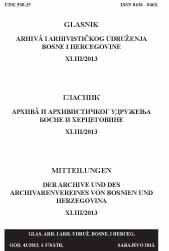Industrija u Bosni i Hercegovini u vrijeme Prvog svjetskog rata
Industry in Bosnia and Herzegovina during the I World War
Author(s): Salkan UžičaninSubject(s): History
Published by: Arhivističko udruženje Bosne i Hercegovine AUBiH
Keywords: Bosna i Hercegovina; Austro–Ugarska; rat; privreda; industrija; proizvodnja; radna snaga; stradanja; razaranja; rekvizicija; redukcija.
Summary/Abstract: The war (1914–1918) fundamentally changed the overall economic life across Europe. It stopped the rapid economic upswing in Bosnia and Herzegovina which started with Austro-Hungarian occupation. Immediately after the declaration of war, wartime laws were introduced and military mobilization was carried out along with the suspension of political liberties. The military regime was introduced it abolished a number of peacetime laws and introduced military ones that, among other things, directed the economic activity of Bosnia and Herzegovina. Great malfunction of industry during the war, created ruthless requisition of labor, militarization and wasteful management of the companies, the lack of raw materials, spare parts, transportation, financial capital, disrupted trade and business ties, weakened domestic market and high tax burdens. Industry is due to limitation of production and forced labor as well as restrictions on the export of goods, suffered huge losses. In most industrial companies there was a decline of production, and a number of companies completely stopped the production. However, certain branches of extractive industries, especially coal and metal mines were able to maintain production at the pre-war level and in some cases exceeded it, due to military needs. Manufacturing, however, with the exception of some branches of food industry, reduced the production by half of its capabilities. Establishment of new factory facilities was completely suspended until 1917, when the economic activity in Bosnia and Herzegovina partially adapted to wartime conditions. The effects and consequences of the war, on the one hand, destroyed the economy and on the other prevented its reconstruction. The destruction was carried out in such a way that parts of industrial plants were destroyed, some were looted and set on fire and roads, railways, factories, livestock, etc. were not used in non wasteful methods and not refurbished. The result was the complete absence of some means of work, or their inability to restore postwar labor productivity to maintain established pre-war levels. Fully or partially ruining the means of production had far-reaching consequences for the operation of the industry in the postwar period.
Journal: Glasnik arhiva i Arhivističkog udruženja Bosne i Hercegovine
- Issue Year: 2013
- Issue No: 43
- Page Range: 249-265
- Page Count: 17
- Language: Bosnian
- Content File-PDF

